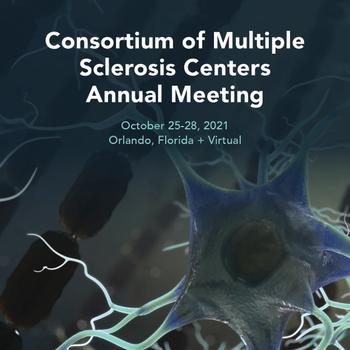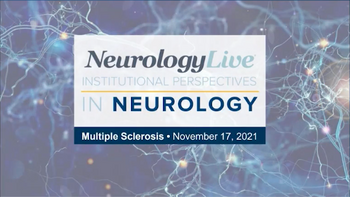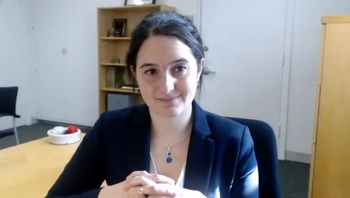
Despite not being significantly superior to placebo on agitation and aggression, lithium showed a greater reduction in those with high Young Mania Rating Scale scores.

Despite not being significantly superior to placebo on agitation and aggression, lithium showed a greater reduction in those with high Young Mania Rating Scale scores.

The NeurologyLive® team has compiled a roundup of our discussions with leaders in the multiple sclerosis field following the 2021 Annual Meeting of the Consortium of Multiple Sclerosis Centers (CMSC).

Ali Rezai, MD, executive chair at the Rockefeller Neuroscience Institute at West Virginia University, outlined early data from a clinical trial utilizing focused ultrasound to open the blood-brain barrier in patients with mild AD.

The executive chair of the Rockefeller Neuroscience Institute at West Virginia University spoke on how technology can be used to open the blood-brain barrier in patients with AD. [WATCH TIME: 7 minutes]

The magnitude of neflamapimod’s effect on several efficacy measures proved to be consistent with the mechanism of action and prior preclinical data, with p-tau181 data suggesting a stronger effect on nonmixed Lewy body pathology.

Chaired by Jennifer Graves, MD, PhD, MAS, the presentations also feature UC San Diego Health experts Jenelle Raynowska, MD; Jennifer Yang, MD; and Anastasie Dunn-Pirio, MD. [WATCH TIME: 1 hour, 23 minutes]

Ali Rezai, MD, executive chair of the Rockefeller Neuroscience Institute at West Virginia University, provided an overview of FUS technology and its use in opening the blood-brain barrier.

A higher incidence of gastrointestinal events was observed in the treatment group compared with placebo, similar to what was seen in clinical trials of AMX0035 in amyotrophic lateral sclerosis.

Discussing cognitive behavioral therapy for patients with MS, the associate professor of Physical Medicine and Rehabilitation and research nonclinical psychologist at the University of Michigan Medicine mentioned different therapeutic options that can benefit this patient population. [WATCH TIME: 3 minutes]

Anna Kratz, PhD, associate professor of Physical Medicine & Rehabilitation, University of Michigan Medicine, spoke to the benefits of a multifaceted approach to managing fatigue for patients with multiple sclerosis.

The associate professor of Physical Medicine & Rehabilitation and research nonclinical psychologist at the University of Michigan Medicine discussed challenges when addressing fatigue, as well as the need to integrate digital tools for patients with MS. [WATCH TIME: 4 minutes]

Over 26 weeks of treatment, masupirdine demonstrated a sustained and durable effect on outcomes such as cognition and dementia-related psychosis.

The associate professor of Physical Medicine & Rehabilitation and nonclinical research psychologist at University of Michigan Medicine discussed the complexities of fatigue as a symptom following her presentation at CMCS 2021.

A presentation at CTAD 2021 included data from 5 patients enrolled in a phase 2a trial to evaluate neurocognitive, imaging, and safety outcomes of the therapeutic approach in early AD dementia.

Findings presented at CTAD 2021 included data from surveyed participants with dementia and healthy volunteers about starting in-person or remote research.

The founder and CEO of Joi Wellness Group Multiple Sclerosis Center described motivations behind the evaluation of ocrelizumab (Ocrevus; Genentech) in minority populations with multiple sclerosis.

The new registry will collect routine clinical practice data from the care of patients with Alzheimer disease who are taking an FDA-approved disease-modifying therapy.

Despite the cohort only consisting of 3 patients with Alzheimer disease, autologous cellular therapy data highlighted the potential of the treatment’s results on cognitive assessments such as Montreal Cognitive Assessment.

The data, which suggest that a lessened decline in cognition and function was correlated with a reduction in plasma p-tau181 levels in those with Alzheimer disease treated with aducanumab (Aduhelm; Biogen), were presented at CTAD 2021.

Study of semorinemab in a larger mITT population confirmed statistically significant reduction in rate of cognitive decline in patients with Alzheimer disease, compared with placebo, but failed to achieve other end points.

Outlining the development of the CHIMES trial in multiple sclerosis, the founder and CEO of Joi Life Wellness Group Multiple Sclerosis Center spoke on tactics to get underrepresented populations involved. [WATCH TIME: 2 minutes]

The founder and CEO of Joi Life Wellness Group Multiple Sclerosis Center outlined the motivations behind the trial, as well as potential reasons for underrepresentation. [WATCH TIME: 2 minutes]

The chief of the Multiple Sclerosis Division, Perelman School of Medicine at the University of Pennsylvania emphasized current recommendations, which suggest patients with MS get vaccinated for COVID-19. [WATCH TIME: 3 minutes]

The professor of neurology at the NYU Grossman School of Medicine provided his thoughts on the most notable strides within the multiple sclerosis field in the past year. [WATCH TIME: 3 minutes]

The director of the Multiple Sclerosis Achievement Center in Sacramento discussed 3-year data from an assessment of the program, outlining key findings and future research efforts. [WATCH TIME: 6 minutes]

The staff neurologist at the Mellen Center for Multiple Sclerosis Treatment and Research at Cleveland Clinic shared her perspective on the use of telemedicine in MS care, what challenges it can address, and the need to optimize its use. [WATCH TIME: 6 minutes]

The chief of the Multiple Sclerosis Division at the Perelman School of Medicine, University of Pennsylvania, discussed recommendations for COVID-19 vaccination in this patient population, specifically for those on disease-modifying therapies. [WATCH TIME: 2 minutes]

Mona Bostick, RDN, LDN, MSCS, gave her perspective on nutrition in MS, popular elimination diets, and the role registered dietitians can play in the multidisciplinary care model.

The director of the Multiple Sclerosis Achievement Center outlined the design of the wellness programs, which are held in 2 different formats. [WATCH TIME: 4 minutes]

Amit Bar-Or, MD, FRCPC, FAAN, FANA, commented on his presentations at CMSC 2021, one of which focused on COVID-19 vaccination, which experts do not believe poses risks for those on disease-modifying therapies.